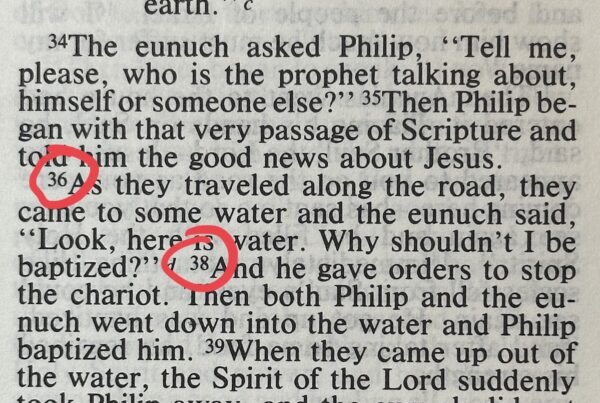[NOTE: A teenager submitted this after a youth retreat. Because of its importance and relevance to so many others, the reply is longer than usual.]I’ve grown apathetic about my faith and I don’t know quite where I stand on Christianity. I believe what the Bible says. I don’t see how there could be any other conclusion about the world other than that it was created by a God. I think I believe what the Bible says in my mind, but my heart isn’t in it. You said at the retreat that we shouldn’t believe on feelings alone, but if we do believe that our feelings will follow. But my feelings don’t seem to have come along for the journey. I haven’t seen God move in my life, and oftentimes I just completely forget He exists. The thought doesn’t cross my mind to pray, so I don’t pray. After reading Romans 12:1-2 … I wrote, “But how do I renew my mind? What can I do to get there from where I am?” I don’t know what to do to change the way I think so that my thoughts will be focused on God.
Thanks so much for your open and honest email. You have expressed your spiritual situation extremely well! And it describes the condition of thousands of young adults like you. I can’t give you three easy steps to resolve everything, but here are some considerations I hope will help.
At the youth retreat, I said something like this: “Faith should not be based on our feelings, but faith should directly affect our feelings.” A major concern you raise, if I can reword it, is that you have faith but you’re not feeling it. And your related questions are, Why am I not feeling it? and What can I do about it?
First, I want to explain why our faith should not be based on our feelings. The biggest question is whether the core beliefs of Christianity are really true. Is it true that the God described in Scripture really exists? Did this God work in miraculous ways in human history or not? Did God really become flesh and dwell among us in Jesus Christ? Did Jesus really perform miracles? Did Jesus really die on the cross to bring forgiveness to sinners? Did Jesus really rise from the dead after being executed by the Romans? Did God really promise to give the Holy Spirit to those who trust Him (Eph. 1:13–14)? The Christian answer to all of these questions is “yes.”
But whether these claims are actually true is not based on our feelings. How we feel about God’s existence, or God’s activity, or Jesus’ identity or works, or Jesus’ bodily resurrection is not relevant to whether these claims are really true. The truth of these claims is not based on our feelings or even whether anyone believes them. These claims point to what is true objectively—independent of our feelings or our acceptance. For instance, if I say your house is on fire, that is an objective truth claim, which points to a reality that is outside your mind or your feelings. If your house is on fire, it doesn’t matter whether you like it, whether you feel like it’s true, or whether you accept it.
I’m so glad that the core truths of the Christian faith do not depend on my feelings. Thank God! My feelings are up and down, depending on the day of the week. I want, and need, something that’s stable—something I can rely on that’s always there and always dependable. Christianity, if it’s true, provides that.
How do I know that Christianity is true? I come to that conclusion from many considerations. In general, among all of the alternatives to Christianity, I am convinced that Christianity best resolves my intellectual questions; it best satisfies my deepest emotional longings, including relieving me from a paralyzing sense of moral guilt; and it best motivates my behavior to live rightly and love others selflessly.
However, I don’t believe that I (or anyone) can have absolute intellectual certainty about the truth of Christianity. But I would quickly add that no one can have absolute intellectual certainly about any philosophical or religious point of view. I do believe, however, that Christianity is the best option available. (For more on this, see my article on “I Don’t Want To Waste My Life On Something False” and my book, Truth About God: What Can We Know and How Can We Know It?)
Second, why haven’t your feelings seem to have followed your faith? Answering this question will require that you honestly examine what you really believe (and what you don’t). You seem to intellectually accept the idea of God’s existence, but it’s not clear that you really believe the unique and core claims of Christianity. Do you truly believe that God really acted miraculously in history (Heb. 1:1-3); that Jesus truly died for you and has taken your condemnation away (Romans 8:1-4); that Jesus was raised from the dead (Acts 2:22-24); and that the Holy Spirit can dwell within you and confirm that you are a child of God who has a close relationship with Him (Rom. 8:9-17)?
If you’re struggling with these questions, then it’s important to try to strengthen your faith in the truth of who God is and what God has throughout history and in Jesus Christ. My guess is that you may be like the very sick boy’s father who said, “I believe; help my unbelief!” (Mark 9:24 ESV). You’re not alone! Fortunately, there are good resources that can help with this.
Why is this relevant to your frustrations about your feelings not following your faith?If we really are convinced, not just of God’s existence, but of his faithful love and fabulous grace that led His son to come in the flesh and die for us, it should have a significant impact on how we actually feel. (See Philippians 2:5-11)
Here’s a biblical illustration. In Luke 7, a very sinful woman came to Jesus while he was eating at a Pharisee’s house. The woman was weeping, and she wiped Jesus’ feet with her tears and anointed his feet with ointment. The Pharisee was shocked. But Jesus pointed out major contrasts between the Pharisee and this woman. The Pharisee gave Jesus no water, but she wiped Jesus’ feet with her tears. The Pharisee gave no kiss at all, but she kissed Jesus’ feet. The Pharisee did not even anoint Jesus’ head with oil, but she anointed Jesus’ feet. What’s the big point? Jesus says it’s this: “Her sins, which are many, are forgiven—for she loved much. But he who is forgiven little, loves little” (v. 47).
The Pharisee didn’t really believe the truth of who Jesus was. He didn’t really believe that Jesus could, or would, forgive him. He didn’t really believe that he was much of a sinner to start with. But the woman knew she was a terrible sinner. She really believed Jesus could forgive her. And because she was convinced of the truth of who Jesus was and what he could do, it created an outburst of love that was evident in kisses and tears and anointment. She “loved much!” Her feelings flowed.
Here’s an application. If we really believe in the truth of who God is and who Jesus is; if we really believe that we are hopeless sinners without God’s grace; if we really believe that Jesus can, and will, forgive us—this will impact our feelings in ways that go far beyond our intellect.
As you become more and more convinced of the truth of who God is and what Jesus has actually done, I believe your feelings will eventually follow. However, you should not expect this to be an instant thing or even an overwhelming thing. The fact is that some people are more feeling-oriented than others. And if you’re more thinking-oriented, the feelings just may not be as notable. But that doesn’t mean that your feelings are not significantly affected.
Third, what can you do about your feelings not following your faith? None of what I can say here can give any guarantee. We can’t force our feelings to come. However, here are two suggestions that could help: (1) Give more attention to knowing why you should believe the core truths of the Christian faith, especially those about who God is and about what Jesus has done. Spend time with good Christian resources (e.g. books, websites, videos) that can strengthen your faith. (See Room For Doubt’s recommended resources.)
(2) Increase your commitment to Scripture (2 Timothy 3:15-16; 2 Peter 1:16-21). I know this is challenging, but it’s necessary if you’re going to grow in your knowledge of God and in your awareness of God’s relevance in your personal life. One strategy is just to read one chapter each day from (a) the Psalms, (b) the gospel of Mark and (c) a New Testament letter like Acts, Philippians, 1 John, or 1 Peter. Another practical tip is to use a Bible app like the Bible Gateway app (https://www.biblegateway.com/app/) or the Bible App (https://www.bible.com/app). A Bible app is really convenient because you can take it wherever you go. It can prompt you to read and prod you to pray.
These two recommendations would be a great way to help “renew your mind” (Rom. 12:1-2), which will also help your feelings flow from your faith.
May God bless your next steps toward greater faith, because “without faith it is impossible to please God, because anyone who comes to him must believe that he exists and that he rewards those who earnestly seek him” (Heb. 11:6; emphasis added).
~ Dr. Rich Knopp is the Director of Room For Doubt and Professor Emeritus of Philosophy & Christian Apologetics, Lincoln Christian University.





